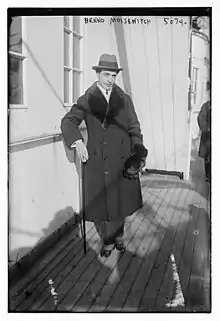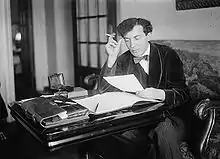Benno Moiseiwitsch
Benno Moiseiwitsch CBE (22 February 1890 – 9 April 1963) was a Russian-born British pianist.


Biography
Moiseiwitsch was born in Odessa, Russian Empire, in present-day Ukraine, and began his studies at age seven with Dmitry Klimov at the Odessa Music Academy. He won the Anton Rubinstein Prize when he was just nine years old. He studied with Theodor Leschetizky in Vienna from 1904 to 1908, then joined his own family in England, making his English debut at Reading in 1908, his London debut the following year.[1] While in Dublin during the war he met another Leschetizky student, Mabel Lander, and they began plans to establish a piano school together in London that would use the Leschetizky method.[2] But the plans had to be abandoned due to Moiseiwitsch's increasingly heavy international concert schedule.[3] He toured the United States (first in 1919), Australia, India, Japan, and South America. Moiseiwitsch was invited by Director Josef Hofmann to teach at the Curtis Institute of Music in 1927. He settled in England and took British citizenship in 1937.
Moiseiwitsch was appointed a Commander of the Order of the British Empire (CBE) in 1946 for his services to music during the Second World War, having performed hundreds of recitals for servicemen and charities.
He married Daisy Kennedy, an Australian concert violinist, and had two daughters, Sandra and the set designer, Tanya Moiseiwitsch. He and his second wife Anita had a son, noted New Zealand National Radio broadcaster Boris Moiseiwitsch.
He was a friend of Nikolai Medtner and commissioned the Piano Concerto No. 3 "Ballade" (1940–43).[4]
Playing style
Moiseiwitsch was particularly known[5] for his interpretations of the late Romantic repertoire, especially the works of Sergei Rachmaninoff (who was an admirer of his playing and referred to Moiseiwitsch as his "spiritual heir"[6]). At the piano, Moiseiwitsch was noted for his elegance, poetry, lyrical phrasing, brilliance, rhythmic freedom, and relaxed virtuosity.
He made recordings for His Master's Voice (now EMI) starting in the 78RPM shellac era, continuing with long-playing records and into the early stereo era. His distinctive style can be heard in his recording of Rachmaninoff's Rhapsody on a Theme of Paganini and the Barcarolle, Ballade No. 4 and Nocturne, Op. 62 of Frédéric Chopin. In 1950 critic and musicologist Irving Kolodin said about the Ballade in F minor of Chopin played by Moiseiwitsch: "A featherweight touch in the opening section of this work, an apt feeling for its "once upon a time" narrative quality give Moiseiwitsch pre-eminence among present day interpreters...", thus summing up the sensitivity of the playing by Benno Moiseiwitsch.[7] He worked meticulously and amicably as a chamber musician, including in Rachmaninoff's Trio Élégiaque and Cello Sonata in G minor. American critic Harold C. Schonberg praised Moiseiwitsch's formidable technique and free approach to the music, adding that such freedom was "always tempered by impeccable musicality."[8]
Discography
There is currently no comprehensive reissue of Moiseiwitsch's entire discography, but much of his recorded output is available on CD. Although there are duplicates of recordings across the labels, they differ in sound quality because of the different restoration techniques employed by the companies.
Releases by Naxos Records Historical
- Vol. 1: SCHUMANN: Kinderszenen / MUSORGSKY: Pictures at an Exhibition (8.110668)
- Vol. 2: LISZT: Hungarian Rhapsody No. 2 / WEBER-TAUSIG: Rondo Brillante, etc. (8.110669)
- Vol. 3: TCHAIKOVSKY: Piano Concertos Nos. 1 and 2 (8.110655)
- Vol. 4: RACHMANINOV: Piano Concertos Nos. 1 and 2 and Rhapsody on a Theme of Paganini (8.110676)
- Vol. 5: GRIEG / SAINT-SAENS: Piano Concertos / LISZT: Hungarian Fantasy (8.110683)
- Vol. 6: DELIUS: Piano Concerto / RAVEL: Jeux d'eau, etc. (8.110689)
- Vol. 7: RACHMANINOV: Preludes / MEDTNER: Sonata, etc. (8.110675)
- Vol. 8: BEETHOVEN: Piano Concertos Nos. 3 and 5 (8.110776)
- Vol. 9: BEETHOVEN: Piano Sonatas Nos. 8, 14, and 21 (8.111115)
- Vol. 10: MOISEIWITSCH, Benno: Acoustic Recordings 1916–1925 (8.111116)
- Vol. 11: CHOPIN: Piano Works (1917–1927) (8.111117)
- Vol. 12: CHOPIN: 24 Preludes / Ballades / Fantaisie-Impromptu (1938–1952) (8.111118)
- Vol. 13: CHOPIN: Recordings 1939–1952 (8.110770)
- BEETHOVEN/BRAHMS/FRANCK: Violin Sonatas (Heifetz) — Moiseiwitsch accompanies Jascha Heifetz in Beethoven's Violin Sonata No. 9 in A major, Op. 47
Releases by APR
- The complete Rachmaninov recordings 1937–43 (APR 5505)
- Benno Moiseiwitsch plays SAINT-SAENS Concerto 2 / GRIEG Concerto / LISZT Hungarian Fantasia (APR 5529)
- Benno Moiseiwitsch plays Beethoven Volume 1 (APR 5530)
- Benno Moiseiwitsch plays Beethoven Volume 2 (APR 5610)
- Benno Moiseiwitsch plays Chopin Volume 1 (APR 5575)
- Benno Moiseiwitsch plays Chopin Volume 2 (APR 5576)
- Benno Moiseiwitsch plays Tchaikovsky
Releases by Pearl
- Benno Moiseiwitsch – The Complete Acoustic Recordings (0142)
- Benno Moiseiwitsch Vol 1 – Brahms, Mendelssohn, et al. (9135)
- Moiseiwitsch In Recital (9192)
Releases by Testament
- Benno Moiseiwitsch Plays Schumann & Brahms (1023)
- Chopin, Schumann, Weber, Medtner, et al. / Benno Moiseiwitsch (1196)
- Delius: Concertos for Violin and Piano, Legende, etc. (1014)
- Moiseiwitsch – Schumann, Grieg: Piano Concertos (1187)
- Benno Moiseiwitsch 3-CD set – Beethoven Piano sonata No. 21 / Schumann – Kreisleriana Op. 16 / Mussorgsky – Pictures at an Exhibition / Beethoven Piano Concerto No. 5 in E flat, Op. 73 / Rachmaninov – Rhapsody on a theme of Paganini, Op. 43 /Chopin – Ballade No. 3 in A flat, Op. 47 / Moiseiwitsch in Interview (SBT31509)
Other releases
- Moisewitsch In Recital – Chopin, Stravinsky, Liszt (ARBITER 120)
- Rachmaninov Piano Concerto No.2, Beethoven Piano Concerto No.5 (BBC LEGENDS 4074)
- Benno Moiseiwitsch (Great Pianists of the 20th Century series by Phillips)
- Benno Moiseiwitsch (GHCH 2326 Label: Guild Historical) — Live recordings of Delius's Piano Concerto and Rachmaninov's Rhapsody on a Theme of Paganini from the Proms in 1955. Also included is a studio recording of Rachmaninov's 2nd Piano Concerto also from 1955.
Bibliography
- MOISEIWITSCH, Maurice. Moiseiwitsch, biography of a Concert Pianist, London: F.Muller, 1965.
Filmography
- Georges Cziffra (EMI DVD Classics 4906819) — Bonus footage of Moiseiwitsch playing Wagner-Liszt: Overture to Tannhauser
- The Art of Piano: Great Pianists of the 20th Century — Moiseiwitsch plays Rachmaninov's Piano Concerto No.2 (excerpt), Prelude in B minor Op.32 (the beginning contains commentary) and speaks about a conversation he had with Rachmaninov.
References
- Kentner, Louis. 'Benno Moiseiwitsch' in The Musical Times, Vol. 104, No. 1444 (June 1963), p. 430
- Brée, Malwine. The Leschetizky Method: A Guide to Fine and Correct Piano Playing (1902)
- Gibb, James. 'Benno Moiséiwitsch Remembered', in The Musical Times, Vol. 131, No. 1764 (Feb. 1990), p 87
- "Medtner: Piano Concerto No. 3 in E minor, Op. 60 'Ballade' (page 1 of 1)". Prestomusic.com. Retrieved 7 August 2020.
- Jean-Pierre Thiollet, 88 notes pour piano solo, Neva Editions, 2015, "Solo nec plus ultra", p. 52.ISBN 978-2-3505-5192-0
- Sergey Prokofiev, Diaries 1907–1914: Prodigious Youth, Cornell University Press (2008), p. 470.
- Irving Kolodin, The New Guide To Recorded Music, Double Day & Company, New York, 1950
- Harold C. Schonberg, The Great Pianists from Mozart to the Present, Simon & Schuster, Second Edition (1987)
External links
| Wikiquote has quotations related to: Benno Moiseiwitsch |
- Playing in the Grand Style – Moiseiwitsch discusses the "Grand Style"